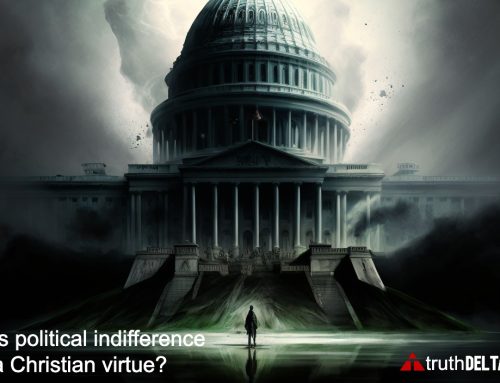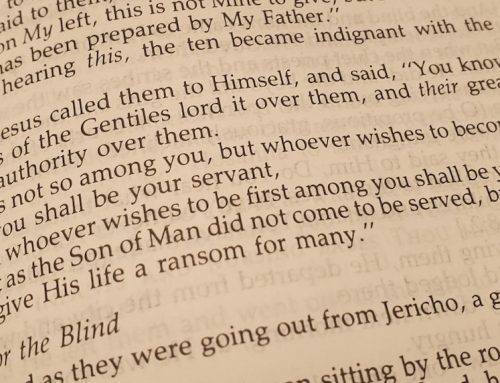Stanton teaches that private sins require private confessions, and public sins require public ones. Thus, if a person runs a red light, they are in public and must confess that sin publicly before God will forgive them. This is, of course, completely foreign to the scriptures, but that is what Stanton teaches.
But what about sins committed by the church body as a whole? It turns out that the whole idea of enforced unity through May Week is a two-edged sword for Stanton. If their unity is so commendable on good things, when they’re wrong, isn’t it a liability? Isn’t that a collective sin that can bring the whole ship down? You can’t have it both ways.
Let’s remember that May Week is essentially a church council. Starting with the First Council of Nicaea in 325 A.D., this practice of convening representatives of each church to deliberate on doctrine was justified back then using the same scriptures Stanton uses—incorrectly—to justify May Week. This false image of unity they boast of is frequently unity on error, rather than unity on truth, and we can trace back the major apostacies of the church to their attempts to enforce unity.
But is it really a unity borne of the Holy Spirit when humans have to convene and debate the subjects endlessly to arrive at it? If it were from the Holy Spirit, they would be unified without a church council, or May Meeting, like Paul when he “conferred not with flesh and blood” after his conversion:
Galatians 1:11-16 – I want you to know, brothers and sisters, that the gospel I preached is not of human origin. I did not receive it from any man, nor was I taught it; rather, I received it by revelation from Jesus Christ. For you have heard of my previous way of life in Judaism, how intensely I persecuted the church of God and tried to destroy it. I was advancing in Judaism beyond many of my own age among my people and was extremely zealous for the traditions of my fathers. But when God, who set me apart from my mother’s womb and called me by his grace, was pleased to reveal his Son in me so that I might preach him among the Gentiles, my immediate response was not to consult any human being.
To further insult our intelligence, when they use this pretense of unity to agree on incorrect teachings, a “new understanding” is reached later and simply whitewashed. They minimize the sin and hurt done to the people affected by those incorrect doctrines.
The people who were targets of the destructive doctrines needed to humble themselves anyway, they say. Or they eventually “fell away” from the church, so they aren’t worth seeking out to ask their forgiveness. They probably won’t come back, and they’re going to hell anyway. So why bother?
Stanton, here’s why you should bother. Because what you did was wrong. It was a sin to question peoples’ innermost thought lives and expose them to the congregation—including children. It was a sin to promulgate a doctrine that encouraged marriages to be broken up unjustly, and children to grow up in a broken homes as a result.
It was a sin to publicly humiliate people for their private sexual sins and addictions, especially since there was no attempt to help them overcome those temptations or addictions. It was a sin for wives to publicly rebuke and withdraw from their own husbands for these matters that were truly between themselves and God. It was a sin to have every person in the congregation see these people come and sit in “withdrawal,” knowing what they had publicly been disciplined for.
It was also a sin to have open conversations about these topics in the presence of very young children. Whispering at fellowships, rides home from church, conversations on the telephone—all of those were fair game to discuss these subjects, and at five years old, you can’t unhear them. Those images came into my head for many years when I would see these people sitting in withdrawal for a decade or more. And I am not the only one who remembers hearing what was happening in bedrooms as early as five and six years old.
According to Stanton, isn’t a confession to be as public as the sin? Stanton, take a look at the verses you hold out to defend standing for public confession, and those same verses describe when Israel had sinned as a nation greatly, and was returning to God with a repentant heart. There was weeping, sitting around in sackcloth all day, and offering of sacrifices for the sins of the nation. They were publicly remorseful for these national sins.
Remorse? Are you kidding? That’s not even in Stanton’s vocabulary. Instead, they minimize it, saying they just “grew in understanding”—meaning essentially that it was the Holy Spirit’s fault for not leading them to this “new understanding” sooner. Have you ever heard of Stanton falling on its collective knees to repent of any of its past sinful “judgments” and the harm they caused to real people, men, women and children alike?
The human cost of these “national sins” of Stanton is great. The list is long of people whose view of God was severely damaged by these teachings and practices. Kids who have vowed to never set foot in a church building again. Adults whose view of God was so tainted that they don’t believe in God anymore, because of that’s what God tells Stanton to do, they want nothing to do with him.
In fact, the irony is that these are real examples of “bringing reproach on the church,” yet the church itself did it, and has made no efforts to make amends with the people hurt in the process. Worse, the church has brought a major reproach on the name of God (the real meaning of the commandment not to take God’s name in vain, which means essentially to drag it through the mud). The “national sins” of Stanton have clearly left a stench in the nostrils of many people, and reproached a loving God and father-figure with their practices.
But the whitewashing of the past continues. When it comes to the “national sins” of Stanton, I keep waiting for a collective confession of guilt and desire to simply apologize to the people whose lives and families have been forever impacted by those hurtful teachings. I do hope it happens, and I will welcome it and applaud it if it does. Until then, the silence is deafening.






Well said Kevin! I will attempt to help answer with what I observed while in the group.The overriding thing I learned and observed in the group was that asking forgiveness was a big deal. Never, ever, ever, was it taught that you needed to also reconcile yourself with the person or persons you had committed sin against.For example, when a teacher that had wrongfully oppressed and rebuked me asked forgiveness, that was all. He would not talk about it, nor did he tell me he was sorry. Just simply asked my forgiveness.Another example was a man who had committed adultery… Read more »
Excellent points. One thing that has become increasingly clear to me is their complete misunderstanding of Matthew 5:23-24 to "be reconciled with your brother." To them, this just means to simply "ask forgiveness" in a formulaic phrase on Saturday night before you can take the Lord's supper on Sunday. As you said, it has absolutely nothing to do with attempting to reconcile a broken relationship with an offended brother. So they actually come right out and say that the church "does not sin?" Wow. That takes gall. Especially when the verses they use to justify standing for public confession are… Read more »
Yes Kevin! I also remember that when they decided that they couldn't "kick" members out of the group anymore (yes, they actually were telling ones they had to leave and not come back again). They tried to find some of those individuals to tell them they could come back, but never did they ask forgiveness for having banned them in the first place. This was pretty early on in my Christianity, I joined in 1985, so it was sometime soon after that.
There was a public correction or confession once. Under Jim Mckilson(not sure of the spelling), the evangelist before the current one in Spring Valley, the church followed his understanding of "withdraw from those of a corrupt mind". When JM left the church and was replaced by GP the churches were instructed to go and find those who had been unscripturally withdrawn from and tell them that the church was wrong in it's understanding and did not stand right before God in this matter, and the people who were withdrawn from and fell away were welcomed back. One woman here in… Read more »
I need to add that after a "teacher"(leader) is sat down, or withdrawn from, for being oppressive the congregation is told that this is God removing the deadwood from the church through oppression and that the church that remains is stronger afterwards for this "purging". Thus oppression is considered both normal and natural by the church. Ever wonder how does God bless a church when evil is normalized?
Yes, I've heard this purging metaphor before. Also, it's fascinating that the end of the interrogation era had more to do with the effect on the interrogator than the victim. This just highlights the narcissism of the upside down world they live in.